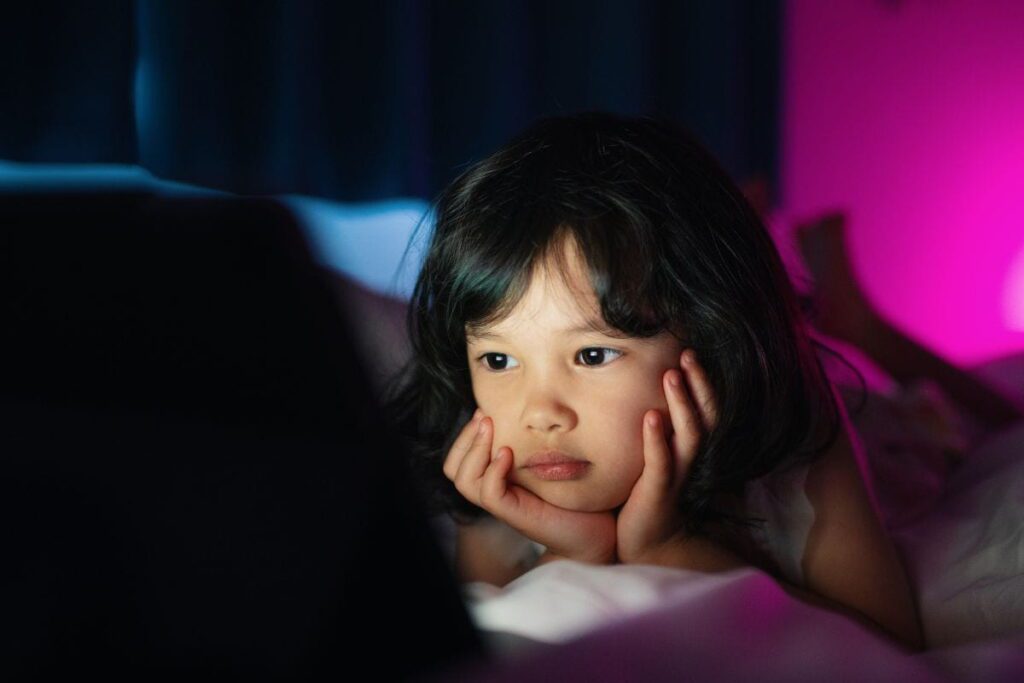In today’s fast digital world, where screens are a big part of our daily lives, it’s really important for parents to know how much time kids spend on screens before bed. This is crucial for creating a healthy and calm bedtime for the little ones. This article will delve into the problems associated with screen time before bed for children’s sleep, explore how blue light affects children’s sleep, determine the ideal daily screen time for children, and provide expert tips on setting limits for a screen-free bedtime routine.
Table of Contents
Why Screen Time Before Bed is Bad for Children
Numerous studies have highlighted the negative repercussions of screen time before bed on children’s sleep. The emission of blue light from electronic devices suppresses the production of melatonin, the hormone responsible for inducing sleep. Exposure to blue light before bedtime can delay the onset of sleep and reduce overall sleep duration. The stimulating nature of content on screens can also lead to increased cognitive arousal, making it challenging for kids to wind down before bedtime. As a result, a disrupted sleep pattern may contribute to a host of issues, including mood swings, difficulty concentrating, and even compromised physical health.
Screen Time’s Negative Impact on Children’s Sleep
- Blue Light Impact: Blue light, prevalent in screens of electronic devices, interferes with the body’s natural circadian rhythm, signaling the brain to stay awake and making it harder for children to fall asleep. Children, with their developing eyes, are particularly susceptible to these disruptions.
- Sleep Disruptions: Engaging with screens, especially in stimulating activities like playing video games or watching exciting content, can lead to increased cognitive arousal. This heightened mental activity makes it difficult for children to wind down and transition into a relaxed state conducive to sleep.
- Delayed Sleep Onset: The exposure to screens before bedtime has been linked to delayed sleep onset. Children may struggle to initiate sleep, leading to shorter overall sleep duration and potential sleep disturbances during the night.
The gIft of a good nIght’s sleep Is the greatest present a parent can gIve to theIr chIld, fosterIng health, happIness, and success
- Impact on Sleep Quality: Even if children manage to fall asleep after screen time, the quality of their sleep may be compromised. Research suggests that the use of electronic devices before bed can contribute to lighter and less restorative sleep.
- Increased Alertness: Screens, with their bright and dynamic displays, can keep children more alert and awake. This heightened state of alertness is counterproductive to the natural process of winding down before bedtime.
- Negative Impact on Mental Health: Poor sleep resulting from screen time before bed can contribute to mood swings, irritability, and difficulties with concentration. In the long term, persistent sleep disturbances may even be linked to mental health issues in children.
- Establishment of Unhealthy Habits: Allowing screen time before bed may establish a habit that is challenging to break. Over time, children may come to associate bedtime with screen-related activities, further exacerbating sleep difficulties.

How Much Screen Time Should a Child Have a Day?
The American Academy of Child and Adolescent Psychiatry provides guidelines on screen time based on a child’s age:
- For Children Ages 18 Months and Younger:
- Avoid the use of screen media, except for video chatting.
- For Children Ages 18 to 24 Months:
- If introduced to digital media, choose high-quality programming and use it together with the child to help them understand.
- For Children Ages 2 to 5 Years:
- Limit screen time to one hour per day of high-quality programming. Co-viewing is encouraged.
- For Children Ages 6 Years and Older:
- Establish consistent limits on the amount of screen time. Ensure a balance between screen time and other healthy activities.
It’s important for parents to monitor the content of what their children are viewing and to encourage a well-rounded lifestyle that includes physical activity, sleep, and face-to-face social interactions. Moreover, It is essential for parents to strike a balance, encouraging outdoor activities, reading, and other screen-free pursuits to promote a well-rounded and healthy lifestyle.
5 Expert Tips for Setting Limits on a Child’s Screen Time Before Bed
It is advisable for parents to establish a screen-free bedtime routine, creating an environment that promotes relaxation and prepares children for a good night’s sleep. Setting limits on screen time, especially before bedtime, is a key component of fostering healthy sleep habits in children.
- Establish a Consistent Bedtime Routine: Creating a predictable bedtime routine helps signal to a child’s body that it’s time to wind down. This can include activities like reading a book, taking a warm bath, or engaging in calming exercises.
- Designate a Screen-Free Zone: Create a designated area in the house, preferably outside the bedroom, where electronic devices are not allowed. This helps in reinforcing the idea that the bedroom is a place for relaxation and sleep.
A well-rested chIld Is lIke a bloomIng flower – vIbrant, resIlIent, and ready to face the world wIth grace and joy
- Use Blue Light Filters: Some devices come with built-in blue light filters that can be activated during the evening. Alternatively, consider installing external blue light filters to mitigate the impact of screens on melatonin production.
- Set Screen Time Limits: Use parental controls and timer apps to set daily limits on screen time. Discuss these limits with your child, emphasizing the importance of a balanced lifestyle that includes sufficient sleep.
- Encourage Physical Activity: Avoid using screens as pacifiers, babysitters, or to stop tantrum. Regular exercise promotes better sleep. Encourage outdoor activities and playtime during the day to ensure that your child expends energy and is ready for a restful night.

Make Smart Food Choices for a Screen-Free Bedtime Routine
Food choices play a crucial role in a child’s sleep routine, especially when considering screen time before bed. While it’s true that children have high energy levels, providing them with the right types of foods before bedtime can contribute to a more restful night. Avoid sugary snacks and incorporate sleep-promoting nutrients such as turkey or a small amount of peanut butter for a calming effect.
- Manage timing of meals: Meals close to bedtime influence sleep. It’s recommended to finish meals at least a few hours before bedtime to allow for proper digestion. Remember, individual responses to food can vary, so it’s essential to pay attention to how specific foods affect your child’s sleep. By combining healthy food choices with a screen-free bedtime routine, parents can create an environment that supports quality sleep for their children.
Insights from Recent Research
According to a recent study conducted by Staples et al. (2021), the use of screens before bedtime has been found to have significant implications for the sleep patterns of young children. The study revealed that 80% of 30-month-olds were observed to engage with screens in the hour leading up to bedtime, and approximately 50% of children incorporated screens into their bedtime routine on at least one night. Furthermore, the research indicated a notable association between evening and bedtime screen use and an increase in parent-reported sleep problems among the children.
Highlights
- 80% of 30-month-olds were observed to use screens in the hour before bedtime
- 50% of children had screens as part of their bedtime routine on at least one night
- Evening and bedtime screen use was related to more parent-reported sleep problems
- Sleep differed with just one night of screen use at the bedtime routine
- Screen use as part of a bedtime routine was associated with poorer nighttime sleep
Interestingly, even a single night of screen use during the bedtime routine was shown to impact sleep patterns significantly. The study found that such screen use was linked to poorer nighttime sleep, emphasizing the potential consequences of integrating screens into children’s pre-sleep routines.
The study’s findings highlight the importance of considering and managing screen time in the hours leading up to bedtime to promote healthier sleep habits in young children. (Staples AD, Hoyniak C, McQuillan ME, Molfese V, Bates JE. “Screen use before bedtime: Consequences for nighttime sleep in young children“. Infant Behav Dev. 2021)
Conclusion
A well-rested chIld Is a happy chIld, ready to embrace the joys of a new day wIth energy and enthusIasm
Understanding the impact of screen time on children’s sleep is paramount in fostering a healthy and holistic lifestyle for your child. By implementing these expert tips and being mindful of screen time before bed, parents can contribute significantly to their child’s well-being. Remember, the goal is not to eliminate screens entirely but to strike a balance that supports healthy sleep patterns and overall development.
By prioritizing a screen-free bedtime routine, parents can create an environment conducive to quality sleep, nurturing their child’s physical and mental health. As we navigate the digital landscape, let’s ensure our children’s sleep remains a top priority, paving the way for brighter, well-rested tomorrows.

